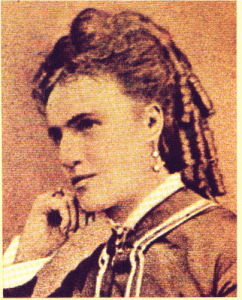
Teresa Stolz
In psychology, empathic accuracy refers to how precisely a person can infer the thoughts and feelings of another person. Contrary to popular urban myth, women do not seem to possess superior empathic abilities to men. Mind you, Peppina Verdi did not have to rely on woman’s intuition at all, as her husband Peppe simply forced her to accept Teresa Stolz as part of the domestic arrangement. When Teresa first visited Sant’Agata, Peppina confided in her diary, “This is without doubt the saddest moment of my life. Signora Stolz arrived today. She is still very beautiful. Darkness, darkness, nothing but darkness ahead of me.” Peppina was jealous and deeply hurt, but concordantly terrified of loosing her husband. Teresa in turn was eager to cultivate a friendship with Peppina as she did not want to loose Peppe — predominantly for professional reasons — either! And Giuseppe was smugly sitting in the middle and feeling pretty good about things.
He certainly wished for Peppina to be happy on his behalf, because after all, Teresa had brought happiness into his life. He once remarked to a friend, “how ridiculous that Peppina is jealous of Teresa! Every time she visits me, she brings vitality and big smiles!” Since Peppina was not inclined to confront the situation head on, she initially adopted a “wait and see” attitude in hopes that her rival would go away sooner rather than later. Teresa, however, was in no hurry so Peppina tried to find a fiancé for Teresa, a suggestion her young rival simply laughed at. On occasion, there was some friction in the household, and after a somewhat heated disagreement — Teresa and Peppe had partied the night away — Peppina wrote: “By now you will have arrived at Florence where I think it best to address this letter. That you love us I know, or rather we know, we believe it, we rejoice in believing it, and we have faith that in you we will never be disappointed. That we love you, you know, you believe it, you rejoice in believing it, and you may be certain that towards you we shall continue the same as long as we live. So, my dear Teresa, that fear of ‘being in the way’ because you saw in me a touch of sadness, is a fear to put by that which made you, for fear of disturbing us, go to your room almost at sunset with the famous phrase: ‘If you’ll excuse me, I’ll retire.’ You are never too much with us as long as you and we remain the honest, loyal hearts we are. With this and a kiss I close the paragraph.” For a while thing stayed relatively calm, and the uneasy threesome even went on summer holiday together. Peppina even suggested that Teresa buys a little villa near their home in Sant’Agata. That way, the affair between Teresa and Peppe could at least be carried on discreetly, and Peppina could keep a close eye on things.

Verdi

